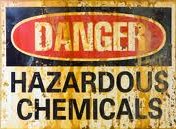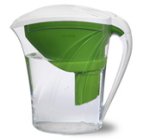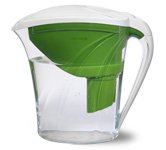Chemicals in Water
To Drink or Not to Drink
Hopefully you have come to realize that drinking water is essential to good health, but if you are like me you worry about all the chemicals in water.
The Importance of Water
With all the things it can and does do for our bodies and our planet, natural pure water is amazing.
Water transports nutrients, gets rid of wastes, acts as an air conditioner and universal solvent, helps other chemicals react with one another, is an element in the lubricating fluid of the eye and around the joints, as well as providing lubrication along the digestive tract. Water plays an essential role in every aspect of life on this planet.
An average adult uses up to three quarts of water a day. Much of the water we get is from food and almost everything we eat is at least 50 percent water. Thus, drinking water is very important. However, as with everything, it is important to get the best possible to maintain good health.
Chemicals in our Water
Some water we drink is a chemical soup. The EPA allows measurable amounts of several contaminants in the water we drink from the tap.
- Does the water you drink have a color?
- Do your ice cubes look cloudy?
- Do your faucets have crusty deposits?
- Is there foam in your water as it splashes into your glass?
A yes to any of these questions means there are chemicals in your water and could indicate your drinking water needs to be improved. You should look into getting some sort of filtration system.
Safe water at the municipal treatment plant does not necessarily mean it is safe for you to drink by the time it comes out of your faucet. Some homes have faulty pipes, soldering or leaks that can alter the water quality.
Some of the chemicals in our drinking water include arsenic; (the EPA is implementing a 10 Parts Per Billion standard rather than the 50 ppb), barium, cyanide, fluoride (too much is a harmful chemical and some feel any is too much) and lead; the EPA feels people who have too much lead in their system in the most part get it from the water they drink.

Mercury, nitrate, and thallium as well as 2,4-D is in our water. The EPA as with any agency has a hard time keeping up with all the contaminants.
What contaminates our water?
Underground storage tanks that leak and land fills which will contaminate our water for years to come as nobody will ever move the source of the contamination. The by-products of our progress have not gone away, but are in the water, the air and have been buried in the soil and forgotten.
When chlorine was added to our water in 1913, virtually the only water problem we had was bacteria. Since then municipal water companies can use 47 different chemicals to "clean up" the drinking water. They may not all be found in a single supply, but any number of them will be found in most any treated water you might drink. Some of the chemicals react with each other.
The problem with tap water is that the sources it's drawn from are polluted with industrial, agricultural and household wastes, so utilities must spend billions of dollars treating it with chlorine and other compounds before sending it to your house. Not only are these disinfectants unable to remove all the contaminants from source water, they create byproducts that are themselves toxic.
Do you think our bodies were created needing these chemicals?
Look around at the increase in afflictions such as asthma, infertility, and ADHD. More people suffer from allergies and skin conditions than ever before. Don't you ever wonder WHY? All those pesticides and chemicals we have been pumping into the environment and into our water are ending up in our bodies.
Once again, your comment may be, but the government wouldn't allow anything to harm us. My comment, wake up and take responsibility. Do some research.
If we have too many minerals in our water, the body has a hard time dealing with these inorganic minerals. We consume hard water saturated with calcium, magnesium, iron, copper, silicon; not realizing the body is unable to assimilate these nutrients efficiently. Nature tucks them in the joints as arthritis, in the intestinal walls as constipation, and along the arteries causing them to harden. The kidneys and liver roll up the mineral deposits into little stones until they get too large for the ducts. Then we could develop kidney stones as well as many other problems.
Yes, we need minerals but only plants need inorganic minerals. (You have seen perhaps what some water does to plug the pipes in your home. Our body has "pipes" too.)
The moral of the story is checking out the water before you put it in your body. The very best in my opinion is one that has gone through reverse osmosis or at least a process that takes out the cryptosporidium, which comes from human fecal and animal waste, as well as chlorine. When our tap water smells stronger of "chlorox" smell, I figure something new was found in the water supply. A study done in 2005 tested municipal water in 42 states and detected some 260 contaminants in public water supplies, 140 of which were unregulated chemicals, that is, chemicals for which public health officials have no safety standards for, much less methods for removing them.
I don't plan to buy spring water from someone's spring with lots of minerals and who knows what else. Controls on selling water are not very strict at the present time. It is first important to know that 25 to 30 percent of bottled water comes straight from municipal tap water systems, despite the pretty nature scenes on the bottles that imply otherwise. Some of that water goes through additional filtering, but some does not. There are no requirements for bottled water to be disinfected or tested for parasites such as cryptosporidium or giardia, unlike more stringent EPA rules regulating tap water.
Recently, PepsiCo was embarrassed into admitting that Aquafina bottled water doesn't come from the bubbling spring high in the blue mountains, but comes from the same public water supplies as a glass of ordinary tap water that costs a fraction of a cent.
If you are drinking your water from a well rather than a municipal water supply, you have a whole different set of problems. Your water could be filled with large amounts of hard minerals as well as any toxins and pesticides that filtered down from the farms production companies upstream from you.
So what can you do?
Be aware of the water with which you are washing off your cells and flushing out toxins.
 Most of the remaining contaminants and byproducts that are left after municipal water system has done its job can be greatly reduced with a simple activated-carbon filter. Pitchers or faucet-mounted filters are the most economical, with yearly costs typically about $100. Countertop and under-the-counter systems cost more up front, but are still much cheaper than spending $1,000 to $2,000 a year on bottled water for a family of four. Many of these larger systems contain a reverse osmosis system.
Most of the remaining contaminants and byproducts that are left after municipal water system has done its job can be greatly reduced with a simple activated-carbon filter. Pitchers or faucet-mounted filters are the most economical, with yearly costs typically about $100. Countertop and under-the-counter systems cost more up front, but are still much cheaper than spending $1,000 to $2,000 a year on bottled water for a family of four. Many of these larger systems contain a reverse osmosis system.
Not only does using a filtration system help your health, but it saves you money and helps reduce the number of plastic bottles and the toxins used to create them.
Click here to read about Toxins
Chemicals in water are only one place we find them in our daily lives.
Click here to read about 'green' cleaners
So take the step to help your health and the health of the planet. Check out some excellent water filtration systems that can start you on the path to better health.
Think about it.
Small changes can create huge rewards.
365 DAYS OF CLEANER, HEALTHIER WATER
 A revolutionary new water filtration pitcher system certified by the Water Quality Association (WQA) to reduce up to 99% of lead—as well as dozens of other nasty contaminants that can turn up in your water and may be harmful to your health. Cleaner, healthier water and a cleaner, healthier planet? We can all drink to that!
A revolutionary new water filtration pitcher system certified by the Water Quality Association (WQA) to reduce up to 99% of lead—as well as dozens of other nasty contaminants that can turn up in your water and may be harmful to your health. Cleaner, healthier water and a cleaner, healthier planet? We can all drink to that!
Return from Chemicals in Water to HealthyLife Home Page

| SHOP for healthy, non-toxic, natural products from a company with a 50 year history |
|---|
Get Green Kit |
Weight Inch Loss Products |
Essential Nutrition Program |
HERBAL LAX laxative |
| AntiAging Skin Care |
Childrens Nutrition |
Soy Protein |
Women's Health |
Cleaners/Laundry Products |
Stress Relievers |
Daily Care Products |
Sports/Active Nutrition |
Heart Health |
Joint and Pain Relief |
Mood, Memory, Sleep, and Energy help: Mind & Spirit |
Digestive Health |




